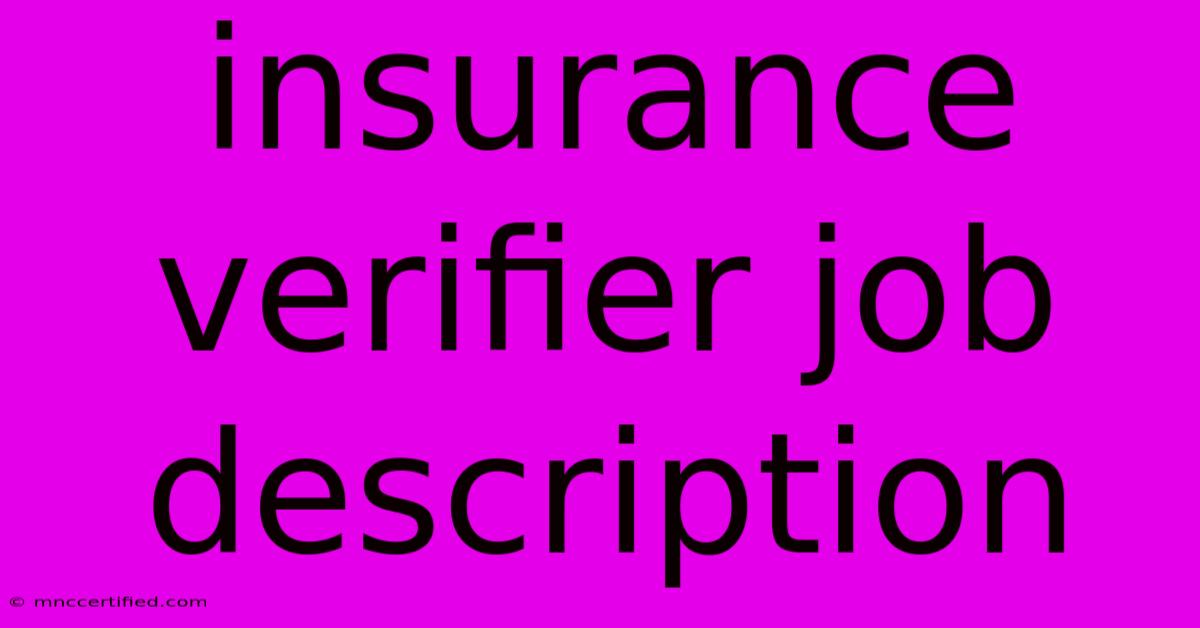Insurance Verifier Job Description

Table of Contents
Insurance Verifier Job Description: A Comprehensive Guide
Are you considering a career as an Insurance Verifier? This comprehensive guide will delve into the key responsibilities, required skills, and career prospects associated with this crucial role in the healthcare and insurance industries. We'll cover everything you need to know, from the day-to-day tasks to the necessary qualifications, making this your go-to resource for understanding this in-demand profession.
What Does an Insurance Verifier Do?
An Insurance Verifier plays a vital role in ensuring smooth and efficient healthcare billing processes. Their primary responsibility is to verify patient insurance coverage before providing services. This involves confirming eligibility, benefits, and other crucial details to prevent claim denials and ensure timely reimbursement for medical providers. The job is multifaceted and requires attention to detail, strong communication skills, and a knack for problem-solving.
Here's a breakdown of typical daily tasks:
- Verifying patient insurance information: This includes checking the accuracy of policy numbers, group numbers, and effective dates.
- Contacting insurance providers: This involves making phone calls or using online portals to confirm coverage details and obtain pre-authorization when required.
- Interpreting Explanation of Benefits (EOB): Analyzing EOBs to identify any discrepancies or issues with insurance payments.
- Updating patient records: Maintaining accurate and up-to-date patient insurance information in the system.
- Resolving insurance claim issues: Working with insurance companies to resolve rejected or denied claims.
- Maintaining organized records: Keeping meticulous records of insurance verifications and claim statuses.
- Collaborating with billing and medical staff: Working closely with other departments to ensure efficient billing processes.
Essential Skills for Insurance Verifiers
Success in this role requires a unique blend of technical and soft skills. Here are some key competencies:
- Strong communication skills: Excellent verbal and written communication is essential for interacting with patients, insurance providers, and colleagues.
- Detail-oriented: Accuracy is paramount in this role, as even small errors can lead to claim denials.
- Problem-solving abilities: The ability to quickly identify and resolve issues with insurance claims is crucial.
- Computer proficiency: Familiarity with various software programs, including electronic health record (EHR) systems and insurance verification portals.
- Knowledge of medical terminology: Understanding medical terminology is essential for accurately interpreting patient information and insurance documents.
- Time management skills: Insurance verifiers often handle a high volume of tasks, requiring excellent time management skills to meet deadlines.
- Knowledge of HIPAA regulations: Compliance with HIPAA regulations is crucial for protecting patient privacy.
Education and Experience Requirements
While specific requirements vary depending on the employer, most Insurance Verifier positions require:
- High school diploma or equivalent: This is typically the minimum education requirement.
- Experience in healthcare or insurance: Prior experience in a medical office or insurance company is often preferred.
- Medical billing and coding certifications (optional but beneficial): Certifications such as Certified Professional Coder (CPC) or Certified Billing and Coding Specialist (CBCS) can enhance your job prospects.
Career Progression and Salary Expectations
The Insurance Verifier role provides a solid foundation for career growth within the healthcare industry. With experience, you can advance to positions such as:
- Medical Biller: Handling the entire billing process, from insurance verification to claim submission.
- Insurance Specialist: Specializing in a particular type of insurance or medical specialty.
- Healthcare Administrator: Managing aspects of healthcare operations.
Salary expectations vary based on location, experience, and employer. Researching average salaries in your area using online resources like Glassdoor or Salary.com will provide a more accurate estimate.
Finding Insurance Verifier Jobs
Numerous avenues exist for finding Insurance Verifier jobs. Here are some strategies:
- Online job boards: Utilize websites like Indeed, LinkedIn, Monster, and CareerBuilder.
- Company websites: Check the career pages of hospitals, medical clinics, and insurance companies directly.
- Networking: Connect with professionals in the healthcare industry through networking events and online communities.
- Recruiters: Work with recruiting agencies specializing in healthcare staffing.
This comprehensive guide provides a thorough overview of the Insurance Verifier job description. By understanding the required skills, responsibilities, and career trajectory, you can effectively pursue this rewarding and in-demand career. Remember to tailor your resume and cover letter to highlight the relevant skills and experience for each specific job application. Good luck!

Thank you for visiting our website wich cover about Insurance Verifier Job Description. We hope the information provided has been useful to you. Feel free to contact us if you have any questions or need further assistance. See you next time and dont miss to bookmark.
Featured Posts
-
Euro Millions Results Nov 19 140m Jackpot
Nov 23, 2024
-
Auction Prince Guitar 381 000
Nov 23, 2024
-
Mc Gregor Found Liable Sexual Assault
Nov 23, 2024
-
Hornets Odac Debut Vs W And L
Nov 23, 2024
-
Video Thanksgiving Forecast Preview
Nov 23, 2024